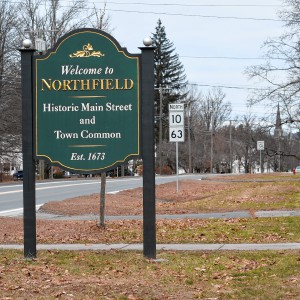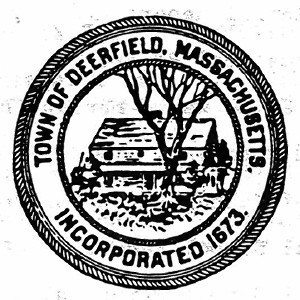A new vocation: Jay Healy talks about life at the Sawmill
| Published: 11-17-2016 11:30 PM |
CHARLEMONT — Former state legislator and Agriculture Secretary Jay Healy stands in cascading sunlight, pouring through a small window in a storage barn at The Sawmill at Hall Tavern Farm, just off Route 2.
“We have some of the best pine trees in the state,” Healy says, referring to the roughly 500 acres of land on his family’s 100-year-old farm in East Charlemont — the oldest privately-owned tree farm in the state.
According to the business’ website, “Hall Tavern Farm wood products are a ‘green’ choice with little or no carbon footprint. 80 percent of our mill’s electricity is solar-generated, while our wood waste boiler heats our kiln … 70 percent of our milled products are from our farm’s trees while remaining business involves milling, drying, and planning material brought to our farm by customers.”
The farm was founded in the 1920s by his grandfather, John J. Healy. After helping to start “a little company called Sun Oil Company,” Jay Healy says his grandfather left the startup business in New York City “lock, stock and barrel, didn’t save one share of stock” and settled in Franklin County.
Jay Healy’s story is equally impressive: he served in state Legislature for 20 years (beginning in 1970), was on the agricultural commission for about 15 years and worked at the U.S. Department of Agriculture as Mass. State Director for five years.
At the same time, he helped to run the farm. Healy’s father, Winston “Bob” Healy, who was a state representative for a few years, died 30 years ago. Since then, Jay Healy has been “working two jobs essentially” in order to keep it going. About five years ago, he stepped out of public service and took over the farm’s management full-time. Today, he runs the mill with Jared Bellows, the farm’s manager, chief mechanic and all-around “jack of all trades.”
While Healy isn’t in politics anymore, his focus on land stewardship and preservation hasn’t changed. Recently, as the website states, Healy “placed a non-development restriction on the farm, ensuring that its natural beauty will be protected forever from development.” He’s also been an advocate to bring more sawmills to Franklin County. Currently, Healy says that more than 90 percent of logs cut down in the region are shipped north, where “value is added” at Canadian sawmills, then shipped right back.
“The ratio of logs going north to south is about 100 to one,” he says, noting that “it’s a missed opportunity.”
Article continues after...
Yesterday's Most Read Articles
 New owners look to build on Thomas Memorial Golf & Country Club’s strengths
New owners look to build on Thomas Memorial Golf & Country Club’s strengths
 Survey shows Northfield residents want new development — but not near their homes
Survey shows Northfield residents want new development — but not near their homes
 Orange man gets 12 to 14 years for child rape
Orange man gets 12 to 14 years for child rape
 As emergency action plan is crafted, Tree House to maintain 1,500 capacity for summer
As emergency action plan is crafted, Tree House to maintain 1,500 capacity for summer
 Real Estate Transactions: April 19, 2024
Real Estate Transactions: April 19, 2024
 Man granted parole for role in 2001 deaths of 2 Dartmouth College professors
Man granted parole for role in 2001 deaths of 2 Dartmouth College professors
In the storage barn, Healy explains that as the economy has changed, The Sawmill at Hall Tavern Farm has created a market for itself by selling products customers can’t purchase elsewhere.
“You can’t buy these in a store,” he continues, gesturing to a stack of “niche boards” — cut in random widths to use the whole tree.
Next to the storage building, a much larger barn houses the mill’s saw. Outside, the farm’s landscape is absolutely breathtaking; a field stretches away, past a few logging trucks and a few piles of logs, to a distant scattering of oak, ash, maple, pine and hemlock trees that quickly becomes dense forest.
It’s from here that loggers source trees and bring them back to “the green chain,” a conveyer belt inside the barn that leads to the farm’s massive, 52-inch circular saw blade, where the logs are cut down into smaller pieces. If they need to be cut again, they’re sent on to a smaller blade called an “edger.”
If they don’t need to be cut, the boards are sent on to a “dry kiln,” where, depending on the species of wood, they sit for up to a few months in order to reduce moisture.
A final step, if needed, is to finish the wood. The sawmill is able to produce both unfinished and finished wood in a variety of lengths, widths and finishing techniques including shiplap and tongue and groove, which is often used for wide-plank flooring — and where Healy says, “the money is.”
“Business is slightly profitable, it’s related to marketing,” he says, while walking toward a smaller building where the wood is planned. Inside, sawdust is piled around a “plainer,” where the wood is finished. “Just two or three floors, that’s the difference between a very good year and a flat year.”
Scrap wood such as edges are rolled up into huge piles, and purchased for “cheap heat” by local businesses and residents.
Back outside, Healy explains that his post-politics life is pretty fulfilling.
“It’s nice to have the same view 30 years later,” he says, while looking out over the field behind the barn. He points out a particularly old hemlock way out in the distance and adds, “you’ve gotta find a balance.”
To contact The Sawmill at Hall Tavern Farm, Healy can be reached by phone at 617-875-8817 or via email at jhealy6387@verizon.net.
You can reach Andy Castillo
at: acastillo@recorder.com
or 413-772-0261, ext. 263
On Twitter: @AndyCCastillo

 $50K allocated for Poet’s Seat Tower sandblasting as officials mull vandalism prevention
$50K allocated for Poet’s Seat Tower sandblasting as officials mull vandalism prevention Deerfield voters to decide 8 capital projects at Town Meeting
Deerfield voters to decide 8 capital projects at Town Meeting Shelter money fading, but ‘not at the end of the line’
Shelter money fading, but ‘not at the end of the line’ Greenfield City Council approves borrowing $1.18M for Main Street redesign, sewer repairs
Greenfield City Council approves borrowing $1.18M for Main Street redesign, sewer repairs
